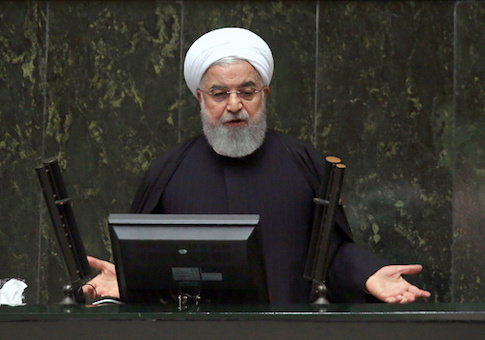A ruling by Iran's highest court against two U.S. citizens imprisoned there renders a broad category of U.S. citizens more vulnerable to being imprisoned if they travel to Iran or nearby countries, an attorney for the pair said Thursday.
The ruling could also make family members of senior Iranian government officials who live and work in the United States vulnerable to being jailed and unjustly charged, the attorney, Jared Genser, said in a lengthy statement.
Earlier this month, Iran confirmed that it had arrested and jailed U.S. navy veteran Michael White, who was visiting a woman he said was his girlfriend. The two met online about four or five years ago and he has traveled to Iran to visit her four times over the last several years, his mother told news outlets.
There are at least 14 Iranian dual or foreign nationals that Iran has arrested and imprisoned since 2014, according to Human Rights Watch. Amnesty International puts the number at 15, including Iranian-Americans Siamak Namazi and his father Baquer Namazi, Chinese-American Xiyue Wang, and Nizar Zakka, a Lebanese national and permanent U.S. resident.
This is the second time an Iranian court rejected the Namazis' appeals. The Namazis' first appeals were rejected in August of 2017.
"There could be dramatic and extraordinary implications for Iranians and American-Iranian dual nationals," Genser said of the Iranian Supreme Court ruling. "Specifically, anyone who works in the United States and pays U.S. taxes to the United States' Treasury, receives assistance from U.S. funded universities, who are involved in scientific or academic studies in the United States, who accept invitations to attend seminars in Iran, or attend any conferences around the world are all vulnerable with being charged and convicted of collaboration with the hostile government of the United States."
"This could even expose family members of senior Iranian government officials who live and work in the United States," he warned.
Zakka was arrested and imprisoned in the fall of 2015 while in Iran. He was there to participate in an internet governance summit an Iranian government official had invited him to attend.
"This unfortunate decision reinforces arguments that in addition to legal efforts, policymakers in the U.S., the European Union, and the more than eight other nations whose nationals are unlawfully held in Iran must join forces to find a solution to these cases," said Zakka's attorney, Jason Poblete. "The United States should also consider not granting any more economic sanctions waivers until the Namazis and other unlawfully detained persons are home with loved ones."
"While the U.S. withdrew from the [Obama-era nuclear deal with Iran, formally titled the Joint Comprehensive Plan of Action, or JCPOA ], waivers make it seem as if there is a JCPOA 2.0," Poblete added.
The Iranian high court also concluded that Iran's National Security Council, which is headed by President Hassan Rouhani, has the ultimate responsibility for the detention of dual nationals like the Namazis and must render a final decision in their case.
"Since President Rouhani has on numerous occasions publicly claimed a desire to help the Namazis and other detailed dual nationals but justifies his inability to do so [by citing nation's separation of powers laws], he can now demonstrate his sincerity and end this ongoing injustice," Genser said.
It is impossible for Iran to claim "friendship" in the Hague and "hostility" in Tehran—and Rouhani, as the head of the National Security Council, has the power to resolve this contradiction.
An Iranian court convicted and sentenced Siamak and Baquer Namazi to 10 years in prison in October 2016 on charges of spying charges that their attorney, Genser, says are completely unfounded. Genser and family members have been pleading with the Iranian government to release father and son, who are dual U.S.-Iranian citizens.
Baquer Namazi, 81, has suffered a series of serious medical emergencies during his time in Iran's notorious Evin prison, and his family has tried to persuade Iran to release him on humanitarian grounds to no avail.
In its ruling, the Iranian Supreme Court declared that the United States and Iran are in a state of "hostility" and blamed the Trump administration for reversing the Obama-era Iran nuclear deal and imposing "oppressive sanctions."
"Considering the hostile actions of the United States government against the Islamic Republican of Iran, such as the oppressive sanctions against the great people of Iran, which recently has been re-imposed … we have no doubt the United States government being hostile and based on [Iranian law] the recognition of this [state of hostility] is with the court and in case of doubt, the National Security Council is the competent body for opining on this topic," the high court said in its decision.
Genser also blasted Iranian National Television for running a 10-part documentary depicting what they described as an infiltration of Iran by the U.S. and British governments, which included Iran's justification for holding the Namazis and others captive.
"The content of this documentary would make a great dark satirical comedy but for the fact the Iranian state is actually trying to get the Iranian people to believe some stunning lies," he said.
The documentary series, he said, claimed that the Namazis are responsible for: United Nations, U.S. and European sanctions against Iran, including on oil and medicine; reducing the size of the Iranian population; importing tainted birth control pills; promoting Christianity; having members of the Namazi family releasing StuxNet virus in Iran's nuclear facilities; and implementing Henry Kissinger's "plan" to reduce Muslim populations.
The Stuxnet virus was a malicious computer worm responsible for causing serious damage to Iran's nuclear program. The worm was a joint effort by Americans and Israelis.
Genser said none of these charges have any bearing in fact.
"The recent Supreme Court decisions and this documentary reaffirm the arbitrary process suffered by the Namazis and highlight the absurdity of the false charges they have come to endure," he said.
